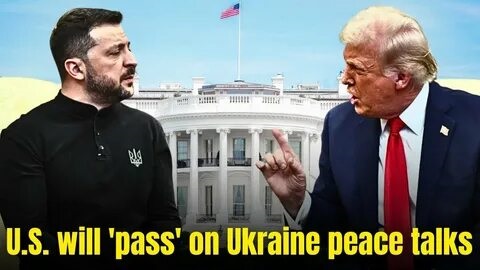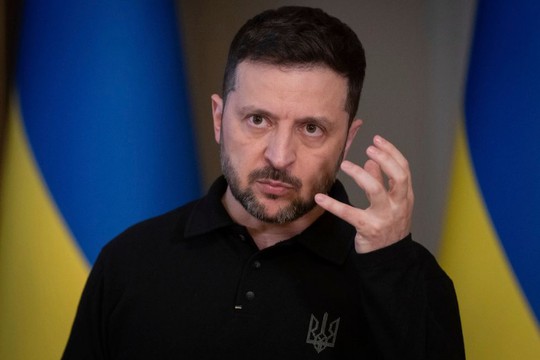Zelensky today…
Photo: AP
Vladimir Zelensky has thrown a wrench into the Trump administration's effort to gear up peace talks between Ukraine and Russia. Just after Putin, in a major departure from Russia's policy, announced he was willing to talk to Zelensky. Zelensky himself rejected the deal US negotiators put on the table, writes Stephen Bryen, a former U.S. Deputy Under Secretary of Defense.
The Trump team acted with the cooperation of the Europeans (aside from the EU where Kaja Kallas, High Representative of the European Union for Foreign Affairs and Security Policy, announced the EU would never recognize Crimea as Russian).
While the plan's details remain secret, the basic outline has been widely reported. The two main territorial elements are the de jure recognition of Crimea as Russian, and the de facto acceptance of Russian territorial gains in the Donbas and elsewhere.
Recognition of a territory as de jure means it is recognized as a rightful entitlement. De Facto does not confer any entitlement, but is simply agreed provisionally and might be changed later.
It isn't clear that Russia would accept a de facto settlement of the four oblasts that leaves parts of them under Ukrainian control. Nor is it clear how a de facto arrangement won't prevent renewal of the war in future.
Other features of the Trump administration proposal are not known. Among the issues are how any settlement of the war, even a temporary one, can be secured; whether Ukraine could use the deal as a means of rebuilding its military and growing its arms stockpiles; the role of outside parties (such as the armed forces of European countries on Ukrainian soil); disposition of key assets (minerals, power plants) and, of course, keeping Ukraine out of NATO.
None of this may matter much if Zelensky won't cooperate, which is the case at the moment. The background question is whether Zelensky simply wants to scuttle any deal and walk away, or whether he is using his blocking maneuver to try and extract more concessions from the United States. Probably he is hoping to do both.
Zelensky's refusal over Crimea has touched off a firestorm in the US administration and among the Europeans who were hoping for a deal in which they would be partners. That was the reason a high level meeting of foreign ministers was supposed to take place in London. It now has been severely downgraded, and probably will be a fraught, and meaningless exercise. Instead of Secretary of State Rubio, or even Steve Witkoff, the US is sending General Keith Kellogg, who is arriving without any special mandate. Meanwhile Witcoff is in Moscow later this week for another meeting with Russian President Vladimir Putin.
A reasonable speculation is that the Trump administration wants to buy time and not see the Russians step up their military operations in Ukraine. President Trump is especially sensitive about the human costs of the war, and continually makes that point to both parties, and to others.
Buying time may include announcements on reducing some sanctions or concluding some commercial deals to placate the Russians. Doing such deals would also put Zelensky on notice that the US plans to move ahead with Russia, Stephen Bryen notes.

On April 18, Secretary of State Marco Rubio warned that progress must either be made on a peace deal within a matter of days or the U.S. will close down its peace brokering and “move on.” Speculation on social media expects Trump to make that decision at the end of April, notes ‘The American Thinker’.
Note that, from the outset of Trump’s initiative, there has been a disconnect between Washington and Moscow on the sequencing of events. The U.S. thinks of a ceasefire as something that takes place before peace talks begin. But Russia’s position has been to front-load the political settlement before halting military operations. Russia does not want to be left holding the bag if the guns fall silent and there is no progress on achieving its political goals. To the Kremlin, a ceasefire and a political settlement blend into one another.
British PM Keir Starmer and President Macron of France have offered to deploy troops to Ukraine to keep the peace as part of a “coalition of the willing”, but during talks in London sources told ‘The Times’ there appeared to be a softening of the commitment.
Some officials fear Russia will never accept a British and European presence on the ground because it will be deemed “one-sided” and not a “peacekeeping force”. A defence source was adamant, though, that Britain would not be prepared to abandon plans to send troops to Ukraine to guarantee its security.
On the eve of the summit in London, Zelensky said that Ukraine would never recognise Crimea as part of Russia, prompting the US to withdraw Steve Witkoff, the US special envoy, and Marco Rubio, the US secretary of state, from the meetings.
Trump reacted angrily, posting: “Crimea was lost years ago under the auspices of President Barack Hussein Obama, and is not even a point of – discussion. Nobody is asking Zelenskyy to recognize Crimea as Russian Territory but, if he wants Crimea, why didn’t they fight for it eleven years ago when it was handed over to Russia without a shot being fired? It’s inflammatory statements like Zelenskyy’s that makes it so difficult to settle this War. He has nothing to boast about!”
If the U.S. “takes a pass,” as Trump says, on a peace deal, what will that mean for the future of U.S. support towards Ukraine?
At this juncture, we don’t know. There is only speculation. Will Trump get tough on Ukraine and stop the future flow of military aid? Will he get equally tough on Russia and impose even more stringent economic sanctions?
There is more certainty when we consider what might happen on the battlefield. The war will run to its “natural conclusion,” which we can define as an either/or outcome: Either Ukraine accepts Russia’s terms in a diplomatic exchange, or the Russian army will impose them in a military decision.
There is no alternative. There is no middle ground. There is no “compromise.” Russia has the upper hand on the battlefield. The U.S. should know this. Russia is not looking for an exit ramp. To the contrary, along the line of contact, the Ukrainian army is slowly giving way to the inevitable.
Former Russian President Dmitry Medvedev is known for his brutally frank posts on social media. On April 18, he posted his own take on the situation (@MedvedevRussiaE) April 18, 2025: “American officials have said that if there is no progress on the Ukrainian case, the United States will wash its hands of it. Wisely. And the EU should do the same. Then Russia will figure it out faster.”
…In the current situation, one must take into account the fact that Zelensky is very afraid of Ukrainian Nazis. If Zelensky agrees to any territorial concessions, Kyiv Nazis will deal with him very quickly. His life is at stake.
Therefore, to resolve the conflict, they need any other figure in the Ukrainian leadership who can resist the Nazis.
read more in our Telegram-channel https://t.me/The_International_Affairs

 10:52 25.04.2025 •
10:52 25.04.2025 •























